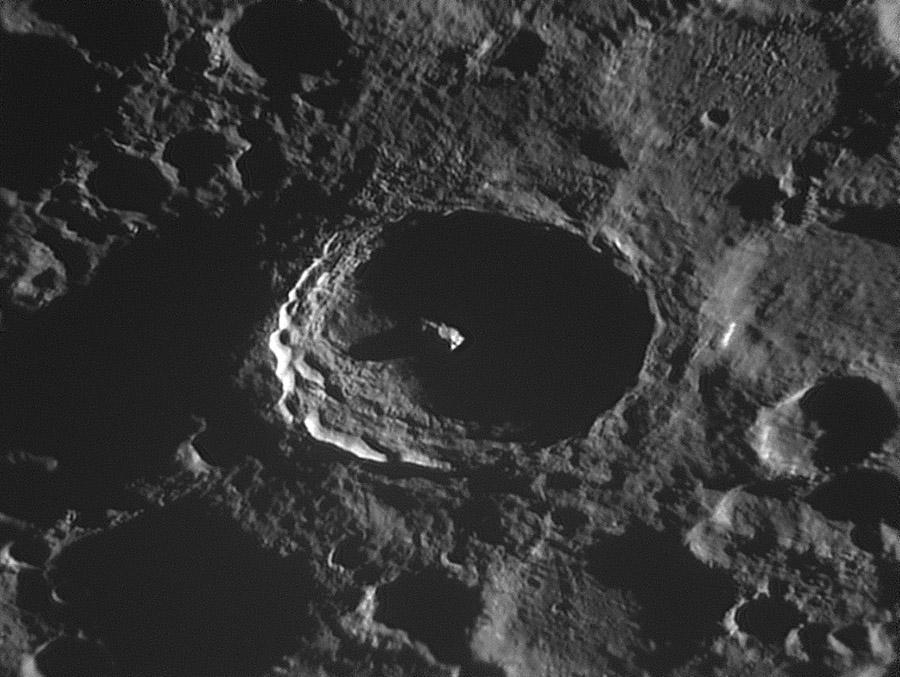Difference between revisions of "June 23, 2014"
| (6 intermediate revisions by the same user not shown) | |||
| Line 1: | Line 1: | ||
__NOTOC__ | __NOTOC__ | ||
=A Lunar King= | =A Lunar King= | ||
| + | <!-- Start of content --> | ||
<!-- ws:start:WikiTextHeadingRule:0:<h1> --> | <!-- ws:start:WikiTextHeadingRule:0:<h1> --> | ||
<!-- ws:start:WikiTextLocalImageRule:6:<img src="/file/view/LPOD-Jun23-14.jpg/514658578/LPOD-Jun23-14.jpg" alt="" title="" /> -->[[File:LPOD-Jun23-14.jpg|LPOD-Jun23-14.jpg]]<!-- ws:end:WikiTextLocalImageRule:6 --><br /> | <!-- ws:start:WikiTextLocalImageRule:6:<img src="/file/view/LPOD-Jun23-14.jpg/514658578/LPOD-Jun23-14.jpg" alt="" title="" /> -->[[File:LPOD-Jun23-14.jpg|LPOD-Jun23-14.jpg]]<!-- ws:end:WikiTextLocalImageRule:6 --><br /> | ||
| − | <em>image by [ | + | <em>image by [mailto:aerts.leo@skynet.be Leo Aerts], Belgium</em><br /> |
<br /> | <br /> | ||
| − | If lunar craters were medieval people, [ | + | If lunar craters were medieval people, [https://the-moon.us/wiki/Tycho Tycho] would be king of a broad fiefdom. Its regal rays envelope, nay claim, a wide swatch of the visible hemisphere, and the crater itself is a majestic treasure of the first order. What I like of Leo's highly textured, high resolution view is the massive shadow of the central peak, which Leo commented, <em>seemingly floats on a black blanket.</em> There is a blanket here, the ejecta that pelted nearly every square centimeter of the region shown. One possible piece of debris is the 6-7 km long (thank you, QuickMap) bright ridge just east of Tycho. Unfortunately, [http://bit.ly/1rojI4R QuickMap] doesn't advance our understanding of this mass, which might simply be a Sun-facing ridge related to the intersection of Tycho's rim deposits with the pre-existing [https://the-moon.us/wiki/Pictet Pictet] crater (QuickMap's nomenclature font has been made smaller than it used to be - hard to read). With all the rough terrain it seems a wonder that [http://en.wikipedia.org/wiki/Surveyor_7 Surveyor 7], which landed just north of Tycho in January of 1968, didn't hit a big boulder and crash. But looks are deceiving, for even young lunar surface material is relatively smooth at the scale of a lander. But all previous lunar landers were lucky to avoid catastrophy-causing boulders.<br /> |
<br /> | <br /> | ||
<em>[mailto:tychocrater@yahoo.com Chuck Wood]</em><br /> | <em>[mailto:tychocrater@yahoo.com Chuck Wood]</em><br /> | ||
| Line 13: | Line 14: | ||
<br /> | <br /> | ||
<strong>Related Links</strong><br /> | <strong>Related Links</strong><br /> | ||
| − | <em>[ | + | <em>[[21st Century Atlas of the Moon|21st Century Atlas]]</em> chart 15.<br /> |
<br /> | <br /> | ||
| + | <p><b>Yesterday's LPOD:</b> [[June 22, 2014|The View From Sicily]] </p> | ||
| + | <p><b>Tomorrow's LPOD:</b> [[June 24, 2014|Fake Lava Flows]] </p> | ||
<hr /> | <hr /> | ||
| + | {{wiki/ArticleFooter}} | ||
Latest revision as of 07:30, 28 October 2018
A Lunar King

image by Leo Aerts, Belgium
If lunar craters were medieval people, Tycho would be king of a broad fiefdom. Its regal rays envelope, nay claim, a wide swatch of the visible hemisphere, and the crater itself is a majestic treasure of the first order. What I like of Leo's highly textured, high resolution view is the massive shadow of the central peak, which Leo commented, seemingly floats on a black blanket. There is a blanket here, the ejecta that pelted nearly every square centimeter of the region shown. One possible piece of debris is the 6-7 km long (thank you, QuickMap) bright ridge just east of Tycho. Unfortunately, QuickMap doesn't advance our understanding of this mass, which might simply be a Sun-facing ridge related to the intersection of Tycho's rim deposits with the pre-existing Pictet crater (QuickMap's nomenclature font has been made smaller than it used to be - hard to read). With all the rough terrain it seems a wonder that Surveyor 7, which landed just north of Tycho in January of 1968, didn't hit a big boulder and crash. But looks are deceiving, for even young lunar surface material is relatively smooth at the scale of a lander. But all previous lunar landers were lucky to avoid catastrophy-causing boulders.
Chuck Wood
Technical Details
June 6th 2014. Celestron 14", 1.8x barlow, dispersion corrector, redfilter and webcam DMK21AU618.
Related Links
21st Century Atlas chart 15.
Yesterday's LPOD: The View From Sicily
Tomorrow's LPOD: Fake Lava Flows
COMMENTS?
Register, Log in, and join in the comments.



